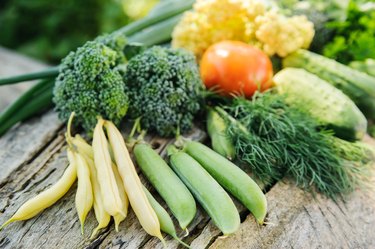If you are experiencing sore muscles or muscular cramps, it could be due to a lack of potassium. Potassium is an important mineral in the body that regulates many bodily functions including healthy muscular function. It is one of the numerous minerals needed by the body to prevent muscle cramps and spasms and can be found in many common foods. So, if you suspect your muscle pain is due to a lack of potassium, include more potassium rich foods in your diet and consult your doctor about potassium supplements.
Potassium
Video of the Day

Potassium is an important mineral for the human body. Potassium is vital for proper heart function, muscle contraction and digestion. A deficiency in potassium can cause many problems, including weakness, lack of energy, muscle cramps, stomach disturbances and an irregular heartbeat. Low potassium levels can also cause high blood pressure and stroke. Potassium can be obtained from a variety of foods, including bananas, citrus fruits, red meat, poultry and seafood. According to MedlinePlus, vegetables such as broccoli, peas, lima beans, tomatoes, potatoes, sweet potatoes and winter squashes are all high in potassium.
Video of the Day
Cause of Muscle Pain
Sore muscles can occur from a lack of potassium. Potassium is an electrolyte that helps muscle function. Therefore, when the body has a low level of electrolytes, muscle cramps and spasms can occur. Potassium can be lost in various ways, including through sweating, diarrhea and dehydration. Often, cramps occur after heavy exercise as the body loses potassium and other electrolytes through heavy sweating. David Berkoff, M.D., assistant professor of surgery, Division of Sports Medicine and Emergency Medicine, Duke University, says that if an athlete does not adequately replace these losses during and after exercise, performance can be negatively affected. According to Mineral Resources International, the deficiency of these electrolytes can cause problems with the body's electrical impulses and lead to muscle cramps.
Other Electrolytes
There are other electrolytes that are important for preventing muscle cramps and pain. These include magnesium, chloride, calcium and sodium. These minerals can be found in foods such as leafy vegetables, dairy products, tomatoes, celery and salt. Replacing these minerals after exercise, diarrhea or heavy sweating is important in preventing muscle cramps.
Other Considerations
Potassium has many health benefits, but too much of this mineral can also present health risks. High potassium levels can cause similar side effects to low potassium levels, such as diarrhea, stomach irritation, nausea, muscle weakness, slowed heart rate and abnormal heart rhythm, according to the University of Maryland Medical Center. Avoid potassium-rich foods if you have kidney problems.